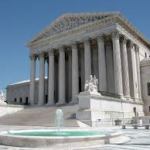Lost in the media memory hole is the fact that Brett Kavanaugh, then an adviser to President George W. Bush and one of his most controversial judicial appointees, had to go through the nomination process twice because of strenuous objection to his nomination, once in 2004 and again in 2006.
Roll Call recently reported, Democratic Senators Once Accused Potential Trump SCOTUS Pick of Offering Misleading Testimony:
 Senators might find themselves debating whether the judge gave false testimony about detainee policy the last time he had a confirmation hearing.
Senators might find themselves debating whether the judge gave false testimony about detainee policy the last time he had a confirmation hearing.
That is in part because the two senators who suggested Kavanaugh may have misled them still serve on the Judiciary Committee.
Kavanaugh’s potential connection to the detention policies in the early 2000s stems from his work as a lawyer in the White House during the George W. Bush administration.
The question of what Kavanaugh knew about the interrogation programs was a topic of discussion during Senate consideration of his nomination to be a judge on the U.S. Court of Appeals for the D.C. Circuit.
Illinois Democratic Sen. Richard J. Durbin, the current minority whip and a long time member of the Judiciary Committee, asked Kavanaugh back in 2006 what he knew about the involvement of William J. Haynes II, who had been a Bush nominee for a Fourth Circuit seat, in developing detainee policies.
“Senator, I did not — I was not involved and am not involved in the questions about the rules governing detention of combatants — and so I do not have the involvement with that,” Kavanaugh said back in May 2006.
Kavanaugh was confirmed. But the following year, news reports established that this answer was misleading at best, and lying to Congress at worst. NPR reported in 2007, Federal Judge Downplayed Role in Detainee Cases:
One of President Bush’s most controversial judicial appointees, Brett Kavanaugh, may have been less-than-forthright with Congress at a crucial hearing last year to confirm his appointment to a seat on the powerful federal appeals court in Washington, D.C.
Read more




